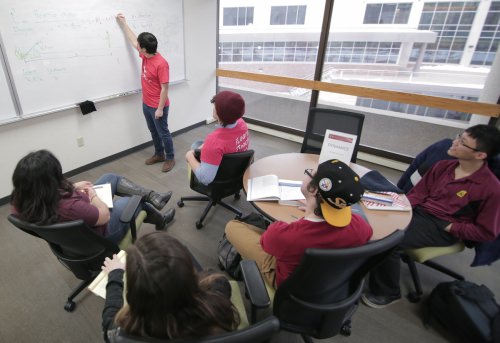Free online course empowers college STEM instructors to improve their teaching
Graduate students, postdocs and professors in the science, technology, engineering and mathematics (STEM) fields share deep devotions to rigorous inquiry. However, many early-career investigators need a little help learning how to lead a classroom.
To help them become more effective teachers, a series of free online courses is being offered by the Center for the Integration of Research, Teaching and Learning (CIRTL), a national network of institutions founded in part by the University of Wisconsin–Madison. The second course in the series, which kicks off June 1, focuses on teaching as research, so participants will learn innovative teaching strategies as well as how to collect data on the efficacy of these approaches in their own classrooms.
“The teaching-as-research process really helps people embrace the scientific process within teaching to help them merge the two parts of their identities in more holistic ways,” says Jessica Maher, associate director of UW–Madison’s Delta Program, a local branch of the CIRTL network. “Participants learn to approach their teaching using the same tools that help them be successful in their research.”

Students taking courses taught in the flipped mode watch pre-recorded lectures, then use class time for instructor-guided problem solving. Photo: Stephanie Precourt
Teaching as research, one of the CIRTL network’s core ideas, empowers STEM educators to enhance the learning experience for both students and teachers through systematic, deliberative and reflective investigation. This ethos underlies the growing body of studies demonstrating the superiority of student-centered teaching strategies — such as active learning — over traditional lecture-based instruction.
“A lot of instructors don’t really believe it until they see data from their own class, specific to their student demographics and their own teaching styles,” says Trina McMahon, Vilas Distinguished Achievement Professor in civil and environmental engineering and bacteriology and faculty co-director of the Delta Program. “Having your own data is compelling. Figuring out how to collect those data really changed my way of thinking. I learned a tremendous amount about where the issues were.”
During the eight-week “massive open online course” (MOOC), participants will learn how to generate hypotheses for their own teaching projects — identifying obstacles to student learning, sifting through the literature for strategies to address the problems and ultimately designing interventions and metrics to evaluate their work.
“The whole process is designed to get current and future faculty teaching in a mindful, evidence-based way, says Delta Program Associate Director Don Gillian-Daniel. “At the end of the semester, you have data on student learning so that you can make informed choices as an instructor.”
“Having your own data is compelling. Figuring out how to collect those data really changed my way of thinking.”
Trina McMahon
Graduate students in the Delta Program have used the teaching-as-research model to develop new exercises for a required introductory chemistry lab, blend in-class problem solving with online lectures in a large introductory physics course, and promote engagement with mathematics through real-world examples.
“Delta interns that do teaching-as-research projects partner with faculty all across campus,” says McMahon. “A lot of times we find that an intern works with a faculty member who isn’t familiar with evidence-based learning strategies, so that specific intervention not only impacts the students in the course but also amplifies into the rest of the instructor’s teaching, which could influence even more undergrads.”
Thanks to the course’s open online nature, educators around the world can access the content. Forty-six universities nationwide participate in the CIRTL network.
“One of the things we hear from participants is that it just makes sense as an approach,” says Gillian-Daniel. “How could you not gather evidence about whether your students are learning?”
The course begins June 1.
Tags: Educational Innovation, STEM, teaching
